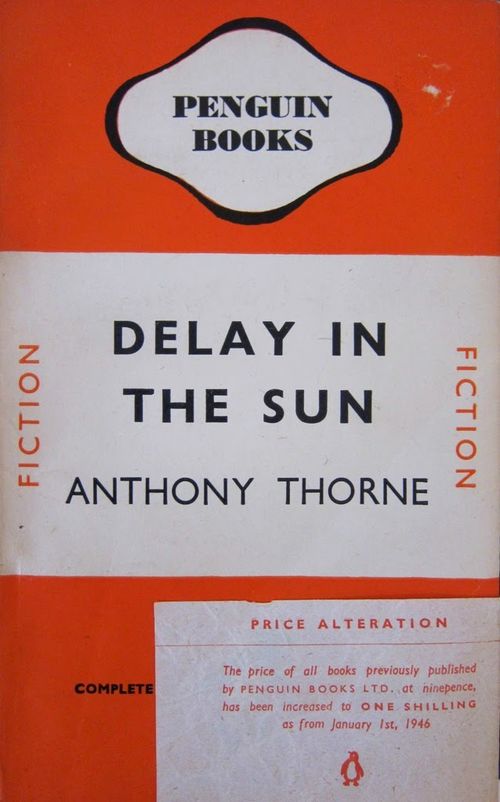Delay in the Sun
Anthony Thorne

The stranded tourists at first cope with this setback by asserting their Englishness, and it is all cups of tea and games of bridge and a steadfast refusal to accommodate themselves or their habits to their altered circumstances – or at least that is how their behaviour is interpreted by Julian and John. This latter pair do not consider themselves to be a part of the group, as in their own eyes they are set apart by a sophistication which is the product of a greater familiarity with European culture, and also by the fact that they had already taken the decision to break their journey towards Corunna, and the ferry back to Plymouth, at Querinda. They were rather dismayed to find that they would be joined in this adventure by seven unwelcome others.
The small town had charmed the pair immediately; John had visions of capturing the fountain, the wavering streets and the odd little church on canvas, and Julian enjoyed the idea of indulging John’s sudden whim. But on returning to the motor coach to retrieve their luggage, they find it gone, having left in its wake a group of distraught English tourists with no clear idea of what they should do next. The tourists head to the Hotel Gran Oriente; Julian and John assert their separateness by heading to a small tavern in the Puerta del Sol.
The stranded tourists form a disparate group: a Jewish salesman; a widow travelling alone on the journey of a lifetime; an ageing spinster, on her way home from a visit to her brother, and desperate to return to her employment on schedule; she is soon to awaken to the realisation that she has forsaken the best that life had to offer on her employer’s behalf. There is also a mesmerisingly attractive but mediocre actor holidaying with his lover who quietly tortures herself with thoughts which dwell upon her own comparative plainness, and two young girls who are barely out of school, one rather masculine and the other attracting the attention of men wherever she goes…’ ~ Delay in the Sun tells the story of a few days in the lives of a set of ill-assorted English tourists who find themselves unexpectedly stranded in a sedate and ramshackle Spanish town by a bus strike. Querinda is isolated by virtue of its poverty, the widespread somnolence and the limited embrace of technology, and so the travellers are effectively imprisoned: irrespective of what any one of them might have been willing to pay to escape in order to continue the journey, there are few cars and no taxis, and so no method of conveyance to the outside world other than the disrupted bus service, or a long and difficult journey by foot.
The stranded tourists at first cope with this setback by asserting their Englishness, and it is all cups of tea and games of bridge and a steadfast refusal to accommodate themselves or their habits to their altered circumstances – or at least that is how their behaviour is interpreted by Julian and John. This latter pair do not consider themselves to be a part of the group, as in their own eyes they are set apart by a sophistication which is the product of a greater familiarity with European culture, and also by the fact that they had already taken the decision to break their journey towards Corunna, and the ferry back to Plymouth, at Querinda. They were rather dismayed to find that they would be joined in this adventure by seven unwelcome others.
The small town had charmed the pair immediately; John had visions of capturing the fountain, the wavering streets and the odd little church on canvas, and Julian enjoyed the idea of indulging John’s sudden whim. But on returning to the motor coach to retrieve their luggage, they find it gone, having left in its wake a group of distraught English tourists with no clear idea of what they should do next. The tourists head to the Hotel Gran Oriente; Julian and John assert their separateness by heading to a small tavern in the Puerta del Sol.
The stranded tourists form a disparate group: a Jewish salesman; a widow travelling alone on the journey of a lifetime; an ageing spinster, on her way home from a visit to her brother, and desperate to return to her employment on schedule; she is soon to awaken to the realisation that she has forsaken the best that life had to offer on her employer’s behalf. There is also a mesmerisingly attractive but mediocre actor holidaying with his lover who quietly tortures herself with thoughts which dwell upon her own comparative plainness, and two young girls who are barely out of school, one rather masculine and the other attracting the attention of men wherever she goes.~ Karyn Reeves, Penguin Blog
Check for it on:
Details
| Genre | Fiction |
| Copyright Date | 1934 |
| Publication Date | 1934 |
| Publisher | The Literary Guild |
| No. of Pages | 301 |
| LoC Classification | PZ3 .T39355 |
| Language | English |
| Rating | Great |
| BookID | 2884 |
